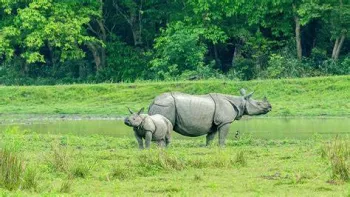National Palace Museum Travel Guide
The National Palace Museum in Taiwan is renowned for housing one of the largest collections of Chinese art and artifacts in the world. It showcases over 700,000 pieces of ancient Chinese imperial treasures, making it a cultural and historical gem of the country. The museum's collection spans 8,000 years of Chinese history, offering visitors a glimpse into the rich heritage of the region. Taiwan's National Palace Museum is a must-visit destination for history buffs and art enthusiasts alike.Top Attractions in National Palace Museum
- Admire the exquisite Jadeite Cabbage
- Marvel at the intricate Meat-shaped Stone
- Explore the stunning Qing Dynasty ceramics
- Discover the famous Calligraphy and Painting galleries
- Stroll through the beautiful museum gardens
National Palace Museum is Famous for
Its unparalleled collection of Chinese imperial treasures.Top Attractions in National Palace Museum
- Admire the exquisite Jadeite Cabbage
- Marvel at the intricate Meat-shaped Stone
- Explore the stunning Qing Dynasty ceramics
- Discover the famous Calligraphy and Painting galleries
- Stroll through the beautiful museum gardens
What's Great about Travelling to National Palace Museum?
- Immerse yourself in Chinese history and culture
- Experience the beauty of ancient art and artifacts
- Learn about the fascinating stories behind each treasure
What's Not So Great about Travelling National Palace Museum?
- May be crowded during peak tourist seasons
- Limited dining options within the museum premises
- Strict security measures for the protection of artifacts
Travel Tips for National Palace Museum
- Check the museum's website for updated exhibition information
- Avoid weekends for a less crowded experience
- Respect the no photography policy in certain galleries
Important National Palace Museum trip information
- Ideal Duration: 1 full day
- Best Time to Visit: Spring or Fall for pleasant weather
- Nearby Airports and Railway Stations: Taipei Songshan Airport and Taipei Main Station
Per Person
19,000
*EXCLUDING APPLICABLE TAXES 5.0 Ratings
( 8 Reviews )
( 8 Reviews )
Per Person
15,000
*EXCLUDING APPLICABLE TAXES Per Person
40,000
*EXCLUDING APPLICABLE TAXES Per Person
24,400
*EXCLUDING APPLICABLE TAXES Per Person
18,000
*EXCLUDING APPLICABLE TAXES FAQ's on National Palace Museum
Q1: What is the best time to visit National Palace Museum?
The best time to visit the National Palace Museum is during the spring and autumn months when the weather is mild and comfortable. Avoiding the summer months can help you steer clear of the humidity and crowds. Consider visiting during the weekdays to avoid peak tourist times. Keep an eye out for any special exhibitions or events that may interest you during your visit.
Q2: Do I need a visa to travel to National Palace Museum?
Travelers to National Palace Museum may need a visa depending on their nationality. Visitors from certain countries may be exempt from visa requirements for short stays. It is advisable to check with the nearest embassy or consulate for the most up-to-date information on visa requirements before your trip. Make sure your passport has a validity of at least six months beyond your planned departure date.
Q3: What are the must-visit attractions in National Palace Museum?
The National Palace Museum is home to a vast collection of Chinese imperial artifacts and artworks, making it a must-visit attraction for history and art enthusiasts. Some of the highlights include the Jadeite Cabbage, Meat-shaped Stone, and the famous Qing Dynasty jadeite cabbage. Explore the various galleries showcasing exquisite ceramics, paintings, calligraphy, and more. Don't miss the opportunity to stroll through the beautiful museum gardens and enjoy the serene surroundings.
Q4: Is National Palace Museum a safe place to travel?
National Palace Museum is considered a safe destination for travelers. However, like any other place, it is essential to remain vigilant, especially in crowded tourist areas. Be cautious of your belongings and surroundings to avoid any mishaps. It is recommended to stay informed about any local news or alerts and follow basic safety precautions during your visit.
Q5: What is the local currency in National Palace Museum and can I use credit cards?
The local currency in Taiwan, where the National Palace Museum is located, is the New Taiwan Dollar (TWD). ATMs are widely available for cash withdrawals, and major credit cards are accepted at most hotels, restaurants, and shops. It is advisable to carry some cash for smaller establishments or markets that may not accept cards. Check with your bank regarding any international transaction fees before using your cards.
Q6: What is the local cuisine like in National Palace Museum?
Taiwanese cuisine is a delightful mix of flavors influenced by Chinese, Japanese, and indigenous traditions. Some popular dishes to try include Beef Noodle Soup, Xiao Long Bao (soup dumplings), and Bubble Tea. Vegetarians will find options like Braised Tofu and Vegetarian Hot Pot. Don't forget to sample street food favorites like Scallion Pancakes and Stinky Tofu. Be prepared for bold flavors, fresh ingredients, and diverse culinary experiences during your visit to National Palace Museum.
Q7: What transportation options are available in National Palace Museum?
Getting around National Palace Museum is convenient with a well-developed transportation system. You can use the efficient metro system, buses, and taxis to navigate the city. Renting a bike is also a popular option for exploring the area at your own pace. Consider purchasing a transportation card for easy access to multiple modes of transport. Taxis are readily available, but make sure the driver uses the meter. If you prefer driving, car rental services are also available, although traffic can be congested during peak hours.
Q8: Are there any cultural norms or etiquette I should be aware of when visiting National Palace Museum?
When visiting National Palace Museum, it is essential to respect local customs and traditions. Remember to remove your shoes before entering homes or certain establishments. Bowing slightly is a common form of greeting, and it is polite to address people by their titles or last names. Refrain from pointing with your fingers and be mindful of public displays of affection. Tipping is not customary in Taiwan. It is considered polite to accept gifts with both hands and avoid opening them immediately. Familiarize yourself with these cultural norms to show respect for the local customs during your visit.
Q9: I am a travel agent. How can I buy travel leads of National Palace Museum?
Register yourself as a travel agent at agents.tripclap.com and then you can buy travel leads to National Palace Museum once your account is approved. For more details contact our support team at +91-8069186564 or support@tripclap.com






